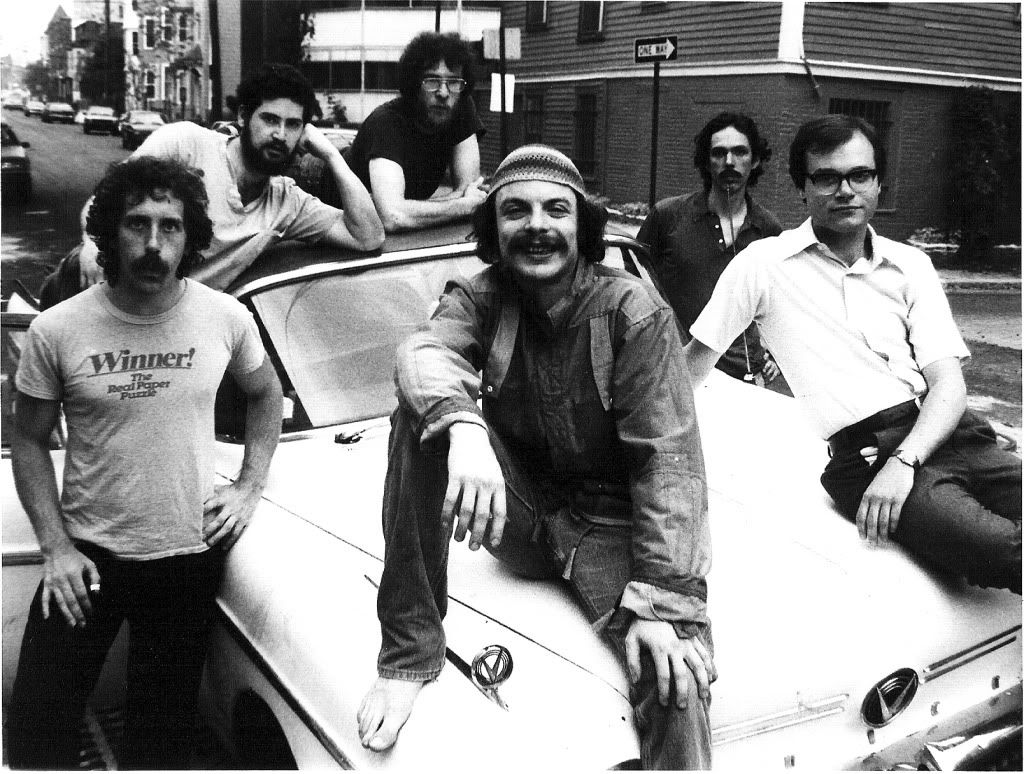Jazz music Warren's music: Antigravity Bob Pilkington Dee Wood old stuff Phil Scarff Rick Barry Tom MacDonald
by Warren
2 comments
Meta
SiteMeter
Brighter Planet
Antigravity, 1980s edition. One of the best bands I’ve ever played in.
ANTIGRAVITY
Phil Scarff – tenor and soprano saxophones.
Bob Pilkington – trombone and percussion.
D. Wood – guitar and percussion.
Warren Senders – bass and percussion.
Rick Barry – percussion.
Tom MacDonald – drums.
Farewell Concert: September 23, 1983.
Old Cambridge Baptist Church, Cambridge, MA
This was an excellent band.




Phil Scarff had really developed his concept by the time we’d been working together for several years, and he and Bob Pilkington made a terrific and energetic horn section. D. Wood was experimenting productively with slide guitar, along with developing a unique set of polymetric right-hand techniques involving a specially-modified thumb pick and a lot of fancy fingering. I had gotten my bass playing to a pretty respectable technical level, with a lot of attention to Hindustani-influenced sliding and gamaks (all, however, pizzicato. My arco playing didn’t develop until I had my “downright” bass to practice on in India). After a long period of development, the music really came into its own once we got the drums/percussion team of Tom MacDonald and Rick Barry on board. I asked Tom to concentrate primarily on cymbals, and Rick to focus on skin and wood sounds. While Tom did have a bass drum and a snare, almost all of his work was in the ringing part of the spectrum. This kept the total sound pretty open and ensured that the two players didn’t get in each other’s way. It was a great experience playing bass with Tom playing cross-rhythms on double hi-hat cymbals.
But all good things must come to an end, and we gave our farewell concert on September 23, 1983, at the Old Cambridge Baptist Church in Harvard Square. The joint was packed; we’d been gigging long enough that we had a substantial fan following, and everybody showed up. The concert was part of a series that I was putting on that year; if I can locate the poster I’ll scan it in.
The multi-miked recording set-up never got up and running, so at the last minute I asked Joel Harrison to use a boombox with an on-board microphone to record the concert. The sound quality may not be great, but it’s adequate…and the band is playing wonderfully. I have greatly enjoyed preparing this material for posting.
———————————————————————————
THE FIRST SET
———————————————————————————
Ishmael
I have the greatest respect for Abdullah Ibrahim (Dollar Brand), and one of the things I admire most about him is his dogged readiness to play the same tunes over and over again. I love hearing many different versions of each of his pieces, and that carried over into my engagement with his music, too. “Ishmael” has been a standby for me since I first learned it from Patti Preiss, back in 1980 or so.
———————————————————————————
Saturn Return
Dee Wood was known to us as “Dogwood.” This is his tune, built around superimposed patterns in a ten-beat rhythm. I always enjoyed playing it.
———————————————————————————
Syzygy
This is one of my very favorite pieces. For some reason it’s never gotten recorded. I tried with the Indian ensemble, and the recording didn’t make the cut for “Boogie for Hanuman.” One day, one day. The scale is interesting: 1, b3, 4, 5, 7, 8; 8, 7, b6, 5, 4, b3, 2, b3, 1.
My bass solo was really a long exploration of Hindustani technique.
———————————————————————————
Lacis Somniorum
For some reason I had a number of tunes which I’d titled in Latin. Lacis Somniorum is a place on the moon, if you’re interested; it means “Lake of Dreams.” There was a piano in the music room at the house where I lived, and one day I was noodling on it; this tune came out.
We always built into a crazy climax before shifting to an extended bass solo. There was a tape-changing problem on this recording, which means that a good portion of the craziness was lost.
The scale is equivalent to the Hindustani raga Basant Mukhari, although there is a single flat third as a passing tone. Can you spot it?
———————————————————————————
“Quarks”
This tune is in a strange sort of 7 feel; four dotted quarters followed by two eighth-notes. The scalar material stays the same, but the accompaniment shifts by a semitone, changing from Lydian to Phrygian. I had a long verbose introduction for this one. Once my friend Morton, who actually knew some physics, was recruited to stand up in a reasonably full jazz club and give a brief lecture on quarks — following which, we played the tune.
———————————————————————————
Life on Planet X
I first discovered this bass line when I was jamming with Dorothy Carter in the late 70s. It’s just kept on giving ever since. The melody was a sort of long-distance re-imagining of some Turkish zurna music I heard in my teens, and it’s been a good friend, too. One of the things I miss about not having a current version of Antigravity is not having an opportunity to play this tune. Once this same lineup was practicing in a room with a street-level door, which was ajar. We were playing “Life on Planet X;” Phil Scarff was in the middle of a terrific saxophone solo when the door opened and a rotund middle-aged African-American woman walked in with a big laundry bag. She plopped the bag down on the floor and sat down with her back resting on it for the next four or five minutes while the band finished the tune. We came to a stop; she got up, said, “That was great!” and went outside again.
———————————————————————————
THE SECOND SET
———————————————————————————
Lover’s Desire
There was an album called “Under the Sun” by the Human Arts Ensemble; it was a lot of people from the BAG in St. Louis and a lot of people from the AACM (not the Ali Akbar College of Music; the Association for the Advancement of Creative Musicians) in Chicago. They were jamming off this tune, which was described as a “folk melody from Afghanistan” for an entire lp side. When Sharrhan Williamson and I were doing flute/percussion busking in the subways in the late 70s, she jotted this tune down off the record and added it to her repertoire. Since then I’ve continued to use it, without ever consciously trying to go back to the original record. It’s probably changed quite a bit since then. We always used this to open second or third sets in clubs; it was a nice way to ease people into Antigravity-world.
———————————————————————————
Ornettarily
I have always enjoyed Bob Pilkington’s compositions, and I learned a tremendous amount from watching him solve rehearsal problems with this band. He really knew (and still knows) an enormous amount about how to make music work.
———————————————————————————
Sailing the Seas Depends on the Helmsman
This was a real oddity. I had somewhere acquired a 45 rpm single from the People’s Republic of China, along with a tiny page of numerical solfege notations for the two tunes. This one became a hot favorite. Seth Deitch and Scott Rasmussen adopted it in their eccentric string music, and I decided that Antigravity should do it as Dixieland. Of course I knew nothing about the appropriate harmonies the tune would require to simulate New Orleans style, so…Pilkington to the rescue! This is totally Bob’s arrangement. My role was to make the suggestion in the first place.
I had an absolutely outrageous intro that I used to do. It was delivered as an ethnomusicological lecture, and the premise was that merchant vessels from China had actually visited New Orleans repeatedly in the last years of the nineteenth century, and that through diligent research and meticulous musicological examination we had concluded that the phenomenon of Jazz actually owed more to Chinese tradition than to any other. Jazz came from China. It was extremely hard to deliver this huge load of nonsense with a straight face, but I managed.
Anyway, that’s the story behind this. Every band needs a few novelties, and “Sailing the Seas” was one of ours.
———————————————————————————
Lonely Woman
Ornette Coleman’s anthem is always a favorite. In accordance with Ornette’s instructions, we never played it the same way twice. By the time this band finished its gigging existence on that day in 1983, we had gotten “never playing it the same way twice” down to something of a science.
———————————————————————————
Cherry
We liked to open with Abdullah Ibrahim’s “Ishmael” and close with his beautiful tune, “Cherry.” When I was studying guitar with D. Wood he transcribed the original solo piano version and arranged it for guitar. It was that arrangement that got transformed into the band version, which was one of the very first tunes that any incarnation of this band ever played.
———————————————————————————
How can I contact you for a possible booking? I tried to send emails but the came back as undeliverable.

I will send you an email.